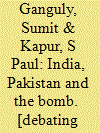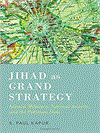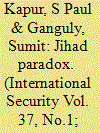|
|
|
Sort Order |
|
|
|
Items / Page
|
|
|
|
|
|
|
| Srl | Item |
| 1 |
ID:
079413


|
|
|
|
|
| Publication |
Stanford, Stanford University Press, 2007.
|
| Description |
x, 262p.
|
| Standard Number |
9780804755498
|
|
|
|
|
|
|
|
|
|
|
|
Copies: C:1/I:0,R:0,Q:0
Circulation
| Accession# | Call# | Current Location | Status | Policy | Location |
| 052760 | 355.02170954/KAP 052760 | Main | On Shelf | General | |
|
|
|
|
| 2 |
ID:
084015


|
|
|
|
|
| Publication |
New Delhi, Oxford University Press, 2008.
|
| Description |
262p.
|
| Standard Number |
0195695909
|
|
|
|
|
|
|
|
|
|
|
|
Copies: C:1/I:0,R:0,Q:0
Circulation
| Accession# | Call# | Current Location | Status | Policy | Location |
| 053769 | 355.02170954/KAP 053769 | Main | On Shelf | General | |
|
|
|
|
| 3 |
ID:
064929


|
|
|
| 4 |
ID:
123120


|
|
|
|
|
| Publication |
2013.
|
| Summary/Abstract |
Significant nuclear reductions by the United States can affect other states in one of five ways: by directly altering their strategic calculations and postures; by indirectly altering their strategic calculations and postures by affecting the behavior of third-party states; by undermining formal US deterrence commitments; by eroding the United States's perceived ability to provide "informal" deterrence through the maintenance of an active global presence; and by creating normative pressure for states to emulate US nuclear reductions. Only the erosion of "informal" deterrence is likely to affect South Asia; to the extent that significant US nuclear reductions affect South Asia, then, their impact is likely to be destabilizing.
|
|
|
|
|
|
|
|
|
|
|
|
|
|
|
|
| 5 |
ID:
067211


|
|
|
| 6 |
ID:
099948


|
|
|
|
|
| Publication |
New Delhi, Penguin Group, 2010.
|
| Description |
x, 132p.
|
| Standard Number |
9780670084753, hbk
|
|
|
|
|
|
|
|
|
|
|
|
Copies: C:2/I:0,R:0,Q:0
Circulation
| Accession# | Call# | Current Location | Status | Policy | Location |
| 055441 | 327.17470954/GAN 055441 | Main | On Shelf | General | |
| 055901 | 327.17470954/GAN 055901 | Main | On Shelf | General | |
|
|
|
|
| 7 |
ID:
153275


|
|
|
|
|
| Publication |
New Delhi, Oxford University Press, 2017.
|
| Description |
177p.hbk
|
| Standard Number |
9780199475179
|
|
|
|
|
|
|
|
|
|
|
|
Copies: C:1/I:0,R:0,Q:0
Circulation
| Accession# | Call# | Current Location | Status | Policy | Location |
| 059127 | 355.03355491/KAP 059127 | Main | On Shelf | General | |
|
|
|
|
| 8 |
ID:
113676


|
|
|
|
|
| Publication |
2012.
|
| Summary/Abstract |
Islamist militants based in Pakistan pose a major threat to regional and international security. Although this problem has only recently received widespread attention, Pakistan has long used militants as strategic tools to compensate for its severe political and material weakness. This use of Islamist militancy has constituted nothing less than a central component of Pakistani grand strategy; supporting jihad has been one of the principal means by which the Pakistani state has sought to produce security for itself. Contrary to the conventional wisdom, the strategy has not been wholly disastrous. Rather, it has achieved important domestic and international successes. Recently, however, Pakistan has begun to suffer from a "jihad paradox": the very conditions that previously made Pakistan's militant policy useful now make it extremely dangerous. Thus, despite its past benefits, the strategy has outlived its utility, and Pakistan will have to abandon it to avoid catastrophe. Other weak states, which may also be tempted to use nonstate actors as strategic tools, should take the Pakistani case as a cautionary lesson.
|
|
|
|
|
|
|
|
|
|
|
|
|
|
|
|
| 9 |
ID:
102385


|
|
|
|
|
| Publication |
2011.
|
| Summary/Abstract |
By deemphasizing the role of nuclear weapons in US security policy, the 2010 Nuclear Posture Review (NPR) could lead India to slow or halt the growth of its nuclear weapons capabilities and to adopt a less assertive nuclear doctrine; however, the NPR is unlikely to have this effect on India's nuclear program. This is the case for two reasons. First, Indian leaders do not seek to emulate US nuclear behavior; they formulate policy based primarily on their assessment of the security threats facing India. Second, Indians do not think that the NPR augurs major changes in US nuclear policy. Thus, it will not alter the international strategic environment sufficiently to enable India to relax its nuclear posture. In fact, Indian strategists believe that the new US policy fails even to match India's current degree of nuclear restraint. Therefore, according to Indian experts, the NPR will have little impact on India.
|
|
|
|
|
|
|
|
|
|
|
|
|
|
|
|
| 10 |
ID:
058427


|
|
|
| 11 |
ID:
093568


|
|
|
| 12 |
ID:
088516


|
|
|
|
|
| Publication |
2009.
|
| Summary/Abstract |
The tenth anniversary of India and Pakistan's 1998 nuclear tests enables scholars to revisit the issue of South Asian proliferation with a decade of hindsight. I argue that nuclear weapons have had two destabilizing effects. First, nuclear weapons' ability to shield Pakistan against all-out Indian retaliation, and to attract international attention to Pakistan's dispute with India, encouraged aggressive Pakistani behavior. This provoked forceful Indian responses, ranging from large-scale mobilization to limited war. Second, these Indo-Pakistani crises led India to adopt a more aggressive military posture toward Pakistan. This could exacerbate security-dilemma dynamics and increase the likelihood of future Indo-Pakistani conflict.
|
|
|
|
|
|
|
|
|
|
|
|
|
|
|
|
| 13 |
ID:
083703


|
|
|
|
|
| Publication |
2008.
|
| Summary/Abstract |
The tenth anniversary of India's and Pakistan's 1998 nuclear tests enables scholars to revisit the issue of South Asian proliferation with a decade of hindsight. What lessons do the intervening years hold regarding nuclear weapons' impact on South Asian security? Some scholars claim that nuclear weapons had a beneficial effect during this period, helping to stabilize historically volatile Indo-Pakistani relations. Such optimistic analyses of proliferation's regional security impact are mistaken, however. Nuclear weapons have had two destabilizing effects on the South Asian security environment. First, nuclear weapons' ability to shield Pakistan against all-out Indian retaliation, and to attract international attention to Pakistan's dispute with India, encouraged aggressive Pakistani behavior. This, in turn, provoked forceful Indian responses, ranging from large-scale mobilization to limited war. Although the resulting Indo-Pakistani crises did not lead to nuclear or full-scale conventional conflict, such fortunate outcomes were not guaranteed and did not result primarily from nuclear deterrence. Second, these Indo-Pakistani crises led India to adopt a more aggressive conventional military posture toward Pakistan. This development could exacerbate regional security-dilemma dynamics and increase the likelihood of Indo-Pakistani conflict in years to come. Thus nuclear weapons not only destabilized South Asia in the first decade after the nuclear tests; they may damage the regional security environment well into the future.
|
|
|
|
|
|
|
|
|
|
|
|
|
|
|
|
|
|
|
|
|